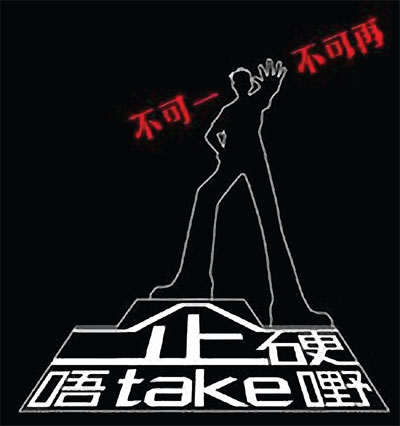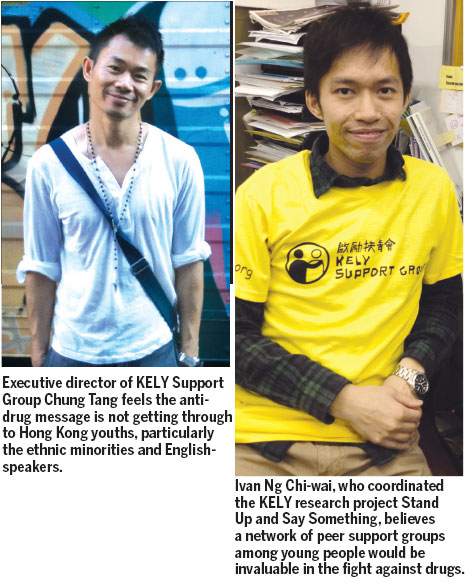No is the hardest word
Updated: 2012-01-04 07:05
By Hazel Knowles(HK Edition)
|
|||||||


New research has revealed two out of 10 young people in Hong Kong fear they are not strong enough to say no to drugs when subjected to peer pressure. Hazel Knowles asks why.
Ben is 18, but has only recently learnt how to say "no". It's a simple word which he believes could have saved him a lot of trouble two years ago when he got in with the wrong crowd and began taking drugs.
"It is very difficult to say no when there is a lot of peer pressure," he admits. "I was hanging around with a pretty negative group and I was smoking a lot of weed. As a result I was having a lot of problems at school.
"There was one guy in the friendship circle who was bad, and probably always will be bad. He had a totally negative impact on the group and I didn't feel I had the skills to stand up to him."
According to a soon-to-be released study, Ben is not alone in feeling unable to stand up to peer pressure as a teenager. The survey carried out by the KELY Support Group and Hong Kong Polytechnic University's Department of Applied Social Science found two out of every 10 young participants admitting feeling unable to say no when offered drugs. Fear of rejection, exclusion or loss of friendship were the factors which made them more likely to give in to pressure.
The survey also found that less the half of the 1,200 young people aged between 13 and 17 interviewed felt confident they knew enough about drugs to be able to make an informed decision.
According to KELY Support Group, a bilingual NGO that aims to provide support for young people in Hong Kong, these statistics highlight a hole in city's anti-drug efforts, one that is leaving many young people without the tools to stand up to pressures to take drugs.
"What people often don't realize is there is a difference between knowing how to say the word 'no' and having the skills to successfully refuse drugs in a socially precarious situation," said KELY's executive director Chung Tang.
"Even if half of young people have enough knowledge to make an informed decision, as our research project showed, it is still dangerous. For the young people who don't have that knowledge when someone offers them drugs, it will be easier to be tempted and to trust the people who are offering the drugs.
"We all know knowledge is power. When young people do not have that knowledge, they feel powerless and are more vulnerable to peer pressure," he said.
The most recent official statistics from the Narcotics Division of the government's Security Bureau appear encouraging, revealing that the number of drug abusers aged under 21 dropped by 20.8 percent from 3,474 to 2,753 between 2008 and 2010.
A Narcotic Division spokesperson told China Daily it was believed the drop in young drug-users was a result of the concerted efforts made by the government and various stakeholders to fight drug abuse with HK$175 million injected into some 246 anti-drug projects between 2008 and 2009. A further HK$3 billion was spent on the Beat Drugs Fund aimed at supporting anti-drug programs in 2010.
A considerable proportion of this effort has focused on drug education in schools, with anti-drug elements being incorporated into the school curriculum. Since it was set up, more than 40 secondary schools have introduced the healthy school program which features drug testing with the aim of helping students develop healthy habits and attitudes.
"In addition, we have produced anti-drug resource kits and provided training to equip teachers, key school personnel and parents with knowledge on drugs, skills for identifying high-risk youth. Telephone support service manned by social workers has also been made available for parents and teachers seeking help on drug-related issues," the spokesperson said.
"The objective is to encourage schools to foster an anti-drug culture as a preventive and early identification measure."
KELY Support Group's Chung is not critical of the hard work which has gone into these anti-drug initiatives. However, the problem, as he sees it, is that despite these efforts, their study still shows the information reaching many young people is not the right kind and while current campaigns are informative and statistical, they are not showing young people how to refuse drugs.
As a result many young people do not have the support nor the skills to successfully tackle the issue, when faced with it in real life, he says.
"There is always more we can do," he said. "Even if the figures show a drop in drug taking among young people, our research shows young people are not getting the right information."
According to Chung one of the big obstacles in anti-drug efforts is the lack of information and programs aimed at English-speaking teenagers and ethnic minorities, two of the groups KELY targets in its work.
"Even local Chinese students who are getting information in their language are not getting the right information in that they are not getting taught the mechanics of how to say no," he said.
"We're not here to lambaste anti-drug organizations or the government, but I think we can always do more by ensuring the information that is out there is age-appropriate and socially and culturally appropriate.
"Young people can't learn to say no on the spot; they need support and they need to learn the process. It is not that they are dumb - they just don't know and they don't have the support."
This was one of the issues highlighted in the study which is part of the KELY Stand Up and Say Something project, the full results of which are expected to be released in the coming weeks.
The project involved focus groups in which young people expressed their feelings about drugs and other issues such as alcohol addiction, plus in depth interviews and a questionnaire-based survey.
Project coordinator Ivan Ng Chi-wai said one of things which came out of the focus groups was the misunderstandings among young people about drugs and that many still felt it was not a big deal to try them.
"Our study highlighted that there is problem with the education young people are receiving about drugs," said Ng.
Ng believes the solution is to build up peer support networks among young people and teach them the right information about drugs along with practical assertive skills, so they can help each other.
"We know young people always turn to each other for advice first. By educating them we can ensure that when one young person is tempted there is someone they can turn to help them, share their problem and come up with a solution," he said.
Chung agrees. "Peer support is very important. Sometimes when adults tell young people things, they feel they don't understand the reality or are not seeing things through their eyes. But they do listen to each other," he said.
"If the message comes from someone like them, using the same language, understanding where they are coming from, then they get it."
In a statement to China Daily, the Narcotics Division said it recognized there was no room for complacency, despite the encouraging signs reflected in the declining number of young drug users.
"Youth drug abuse problem is a complex social issue. Considering in particular the hidden nature of the abuse of ketamine, 'ice' and cocaine, which are the most popular psychotropic substances of abuse, we have to continue to monitor the situation closely and collaborate with different stakeholders to take timely measures to the combat the problem," said a spokesperson.
In recognition that more needs to be done among non-Chinese speaking or ethnic minority students, the spokesperson said funds had been set aside for initiatives aimed at these groups with its Beat Drug Fund supporting various programmes for ethnic minority groups and their families.
"The Home Affairs Department and the police also organize district-based programs dedicated to ethnic minority youths, such as provision of peer counselling sessions on the harmful effect of drugs by rehabilitees recruited and trained among ethnic minority groups in the local community," she said.
In the absence of positive influences among his own friends, Ben turned to the KELY Support Group when he realized he was on dangerous path. There he says he found the peer support he needed to help him break away from the negative group and to become more assertive so he felt less vulnerable to peer pressure.
"I feel stronger now," he says. "I suppose that has come with getting older, but when you are 15 or 16 you don't know what you are doing.
"I think if a lot of kids really knew the hard facts they wouldn't do drugs. Prior to coming to KELY, I didn't know the effects of some of the drugs I was taking. I was actually quite shocked when I found out. I think I wouldn't have been so careless had I known the facts.
"Also I learnt how to identify bad characters, the kind that should be avoided. I think that is something all young people need to learn. They need to understand that someone who gets them to take drugs, to deal, and do bad things, is not a friend."
|
The KELY Support Group celebrates 20 years of empowering Hong Kong young people in December. Group Patron Anne Marden (right) cuts into a birthday cake helped by founder Andrew Jones and chairwoman Diane Bohm (left). |
(HK Edition 01/04/2012 page4)
